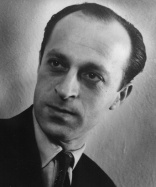The Americans
Chorale’s June concert program will include a cappella pieces by American composers Stephen Paulus (1949-2014), Vincent Persichetti (1915-1987), Jean Berger (1909-2002), Morten Lauridsen (b.1943), and Abba Yosef Weisgal (1885-1981).

Abba Weisgal was born in Kikl, Poland, and received his musical training—both as a cantor, and as a composer—first in Breslau, then in Vienna. He served as an officer in the Austrian army during World War I, and then took up cantorial duties in Eibeschitz, Bohemia. He immigrated with his family to the United States in 1921, hoping to become an opera composer. Very soon after his arrival, however, he was engaged as full-time cantor by the Chizuk Amuno congregation in Baltimore, where he remained for more than forty years, utilizing his compositional talent and skills to provide music for conservative and reform worship. His son, Hugo Weisgall (1912-1997), did become a noted opera composer. Sim Sholom is typical of Abba Weisgal’s liturgical works: it combines elements of Eastern European, Ashkenazic Judaism with the reform, German-influenced procedures inherited from such nineteenth-century composers as Salomon Sulzer and Louis Lewandowski.
Morton Lauridsen grew up in Portland, Oregon, in a Danish immigrant family. After graduating from Whitman College, he studied composition at the University of Southern California. Following his graduation in 1967, he joined the faculty at U.S.C., later becoming chair of the composition department. In 1994, he became composer-in-residence for the Los Angeles Master Chorale, conducted at that time by Paul Salamunovich; through this collaboration, his choral works have become widely known and performed; today he is America’s most frequently-performed choral composer. “O Nata Lux” is an a cappella movement from Lux Aeterna, one of seven major vocal cycles Lauridsen has composed. After its premier in 1997, a writer for The Times called it “a classic of new American choral writing” and said “old world structures and new world spirit intertwine in a cunningly written score, at once sensuous and spare.” He utilizes a limited, conservative tonal palette, enlivened by lyrical melodic lines and unusual chord spacings. His music owes a debt to the spiritual minimalist movement, represented by Arvo Pärt and John Tavener, but has an unmistakably American sound—influenced by popular music of the earlier twentieth century.
Vincent Persichetti, a native of Philadephia, was an extraordinarily prolific composer, and the catalogue of his works astonishes with its breadth-- he wrote for piano, organ, wind ensemble, chamber ensemble, big band, symphony orchestra, solo voice, and chorus. He taught theory and composition first at the Philadelphia Conservatory, and later at the Juilliard School, and was editorial director of the Elkan-Vogel publishing house. He was one of the foremost representatives of what has become known as the American academic school of composition, along with William Schumann and Walter Piston. His compositional “voice” is somewhat eclectic-- it is hard to pin down a specific Persichetti sound; rather, he seems to adapt his materials to the instruments or purposes for which his music is intended. His Mass, Opus 84, for unaccompanied voices, commissioned by New York’s Collegiate Chorale in 1960, is a good example of this: based on a Phrygian mode Gregorian chant, it sounds on many ways like a Renaissance a cappella mass, with a nearly constant imitative counterpoint texture of relying on imitative counterpoint as its chief developmental procedure. Most of the Mass has a dark, somewhat cool, detached, introspective sound; the Agnus Dei movement, which Chorale will sing, is, by contrast, ardent and emotionally expressive.
Unlike Persichetti, Jean Berger focused his creative energies almost entirely on vocal and choral music. Like Weisgal, he was originally European—his original name was Arthur Schlossberg, and he was born into Jewish family and grew up in Alsace-Lorraine. He studied musicology at the universities of Vienna and Heidelberg, and received his Ph.D. in 1931. After the Nazis seized power in Germany in 1933, he moved to Paris, where he took the French name Jean Berger, and toured widely as a pianist and accompanist. In 1941, he moved to the United States, joined the U.S. Army, and became a citizen. After the war, he held academic positions in musicology at Middlebury College, the University of Illinois, and the University of Colorado. In 1964 he founded the John Sheppard Music Press in Boulder, Colo., and later Denver. As a musicologist, Berger edited several 17th century works and wrote about the Italian composer Giacomo Perti. His compositional output was not enormous; but several of his choral octavos, including The Eyes of All, are among the best-known and most popular American choral works.
Stephen Paulus lived for most of his life in St. Paul, Minnesota, and received both undergraduate and graduate degrees from the University of Minnesota. He composed over 450 works for chorus, orchestra, chamber ensemble, opera, solo voice, piano, guitar, organ, and band; and he held Composer in Residence positions with the orchestras of Atlanta, Minnesota, Tucson and Annapolis. He is best known for his choral music and opera, ranging from elaborate multi-part works and operas with extensive choral scenes, to brief anthems and a cappella motets. Chicago Chorale commissioned a work from him in 2007, entitled And Give Us Peace, which we both premiered and recorded. Pilgrims’ Hymn, which was sung at the funerals of Presidents Ronald Reagan and Gerald Ford, is a very successful hybrid: though it functions as a motet, is actually a chorus from his “church opera,“ The Three Hermits. In contrast to the other composers on this “American” list, Paulus never held a “day job”: his entire career was focused on composing and publishing his own music.




